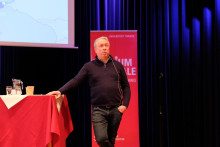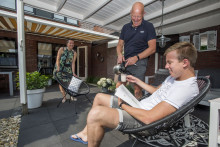How do you look back on the NATO summit and recent developments leading up to it?
‘What the Israel-Iran flare-up has shown is how vital missile defence has become. Iran has tried to hit back at Israel, and they’ve actually managed to do some damage. But they have been weakened, driving them into the arms of Russia. It may seem a good thing that Iran’s religious dictatorship is weakened, but we’d probably get a military one in return if it were to fall, which is even worse. Every country understands now that they need their own independent defence capacity.’
‘As far as the NATO Summit concerns: Overall, it’s good to see that everyone is on board now. Old allies are banding together, and do more for their own defence. It’s still early days, but the first signs are there already. The EU and Canada have strengthened their ties, militarily and economically. I think that’s a good thing.’
What were key learnings of these recent days?
‘One major learning point from the recent NATO summit is how to manoeuvre Donald Trump into believing he’s the big man who’s made the tough decisions, effectively getting him on our side. Israel’s Netanyahu has mastered this, too. He played him like a fiddle, bombing Iran and then saying ‘Donald, we need your strength to finish the job.’ But I think Trump has grasped now that he’s been played, getting dragged into another war, while he made big promises to the contrary.’
‘The whole kerfuffle with Spain not upping their military spending was something too. Their spending isn’t lower than before, it’s simply lower than the rest, who have pulled up their socks now. What’s been under everyone’s radar so far is that Spain’s favourable financial and legal climate is a highly attractive place for American software companies to settle. And those extra military funds need to come from somewhere.’
‘The agreed five percent military spending has been split into a proper defence budget and a side that covers anything remotely military-related, including infrastructure and secondary areas like healthcare.’
‘We’ve heard big words and seen new commitments, but we’ll have to wait and see what comes of it.’
What opportunities does the current status quo give us?
‘Military purchases are usually highly bureaucratic, but Ukraine’s military forces have shown that they can simply buy stuff online and get it delivered near the frontlines if needed. This more agile approach shows that high-tech warfare and commerce can go hand in hand, opening up collaborative avenues. If you want to make some money now, my bet would be on start-ups that specialise in software, radar, electronic communications, cybersecurity, chips, and drone technology. Exactly the kind of things the UT community is all about.
What must UT prepare for?
With Iran weakened, we can expect them to resort to cyber attacks instead. This means we as a highly interconnected, technical university must take precautions when it comes to our online security. It also means that UT must stay on top of their game when it comes to vetting new students and lecturers from red-listed countries.’
‘The current balance on the world stage is far from ideal, what with Russia and China breathing down our necks. So apart from a business perspective, I think the academic community, and technical universities such as UT in particular, have a duty to put their bright minds to work, to make ourselves stronger and to help tip the balance in favour of NATO.’







